Saint Omer Blu-ray Movie
HomeSaint Omer Blu-ray Movie 
Criterion | 2022 | 123 min | Not rated | Mar 26, 2024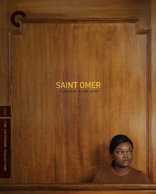
Price
List price:Amazon: $32.28 (Save 19%)
Third party: $32.28 (Save 19%)
Only 20 left in stock (more on the way).
Movie rating
6.9 | / 10 |
Blu-ray rating
| Users | 0.0 | |
| Reviewer | 4.5 | |
| Overall | 4.5 |
Overview
Saint Omer (2022)
Follows Rama, a novelist who attends the trial of Laurence Coly at the Saint-Omer Criminal Court to use her story to write a modern-day adaptation of the ancient myth of Medea, but things don't go as expected.
Starring: Fatih SahinDirector: Alice Diop
| Foreign | Uncertain |
| Drama | Uncertain |
Specifications
Video
Video codec: MPEG-4 AVC
Video resolution: 1080p
Aspect ratio: 1.85:1
Original aspect ratio: 1.85:1
Audio
French: DTS-HD Master Audio 5.1 (48kHz, 24-bit)
Subtitles
English
Discs
Blu-ray Disc
Single disc (1 BD)
Playback
Region A (locked)
Review
Rating summary
| Movie | 4.5 | |
| Video | 4.5 | |
| Audio | 4.0 | |
| Extras | 4.5 | |
| Overall | 4.5 |
Saint Omer Blu-ray Movie Review
Reviewed by Justin Dekker March 28, 2024Alice Diop's 2022 film 'Saint Omer' arrives on Blu-ray courtesy of Criterion. Based on a true story, the film follows Laurence Coly (Guslagie Malanda), a young mother who is on trial for drowning her infant daughter as it considers the complex and evolving roles and relationships women must navigate. Beautifully shot and wonderfully cast, the film is outfitted with an excellent transfer, a solid audio track, and approximately two hours of interviews with the director as she discusses this project and topics.
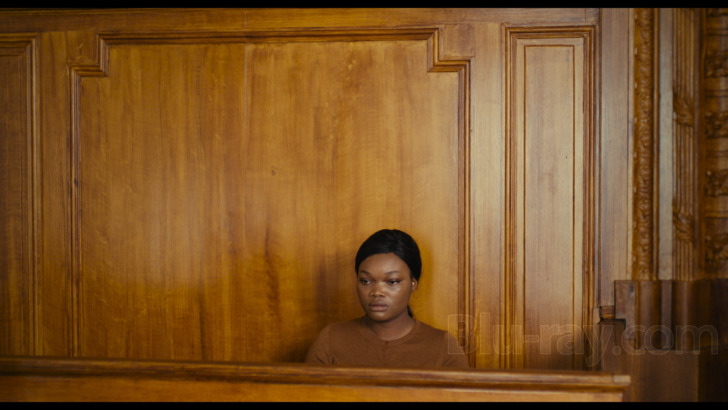
Referring to Alice Diop's Saint Omer as a courtroom drama, while technically accurate, is slightly problematic. Those sorts of films call to mind a series of tropes that must be strictly followed in order to appease audiences and thereby succeed. There need to be high-toned lawyers with enormous skill sets and egos to match. There needs to be some level of drama over evidence lost or found that dramatically swings the case in one direction or another. Cross-examinations should be flashy and theatrical, loaded with trick questions, squirm-inducing admissions, and satisfying "gotcha" moments. Legalese should flow so freely, frequently, and with such confidence that viewers should feel as if they just completed their first year of law school by the time the credits roll. And finally, either by snatching victory from the jaws of defeat with last-minute legal heroics or by triumphantly driving home an iron-clad case, the guilty must be punished or the innocent freed into the arms of waiting loved ones in the closing frames. Saint Omer does none of those things.
Based on the case of Fabienne Kabou, Diop constructs the story of Laurence Coly (Guslagie Malanda) a young Senegalese woman accused of drowning her 15-month-old daughter. In attendance at the trial is Rama (Kayije Kagame), a writer who is there gathering information for her current project. It's through her eyes that we see the trial unfold, thereby effectively keeping the audience in the dark regarding legal strategy and far away from a definitive understanding of Coly's mind and motivations. Stripping away the vast majority of legal jargon and maneuvering also keeps the film focused on Coly's emotional and psychological underpinnings which becomes increasingly important as Rama finds more in common with Coly's feelings and experience as the trial progresses.
Language is enormously important to the film. Much of what is said in the courtroom scenes is directly lifted from the transcripts of the Kabou trial with only minimal editing or reworking. As a result, we understand full well how Coly uses her elevated and educated choice of words and sentence structure to keep people at a distance It's difficult to feel close to someone if you're not quite speaking the same language. Further, her word choice leads members of the court to claim from time to time that she is being ambiguous. And that's accurate; at times it is very unclear exactly what Coly is driving at as she answers questions and delivers testimony. Coly, using her training in philosophy, further confounds by dragging the metaphysical into her statements as she asserts that there are some thoughts and feelings that simply cannot be expressed in words, effectively making her mind and motivations virtually unknowable. It absolutely makes for fascinating viewing, but it routinely raises far more questions than it answers.
As critical as language is, its absence is equally critical and the long stretches of the film that play out without dialogue are used to communicate a great deal. The silence from the students in Rama's classroom highlights her isolation. Even in this crowded place, as she lectures and looks out over a room filled with students, there is only one other person of color. As a whole, they're not engaged. They're focused on the task at hand and Rama just happens to be there, a conduit of information and data and nothing more. As she travels to Saint-Omer, again her silence speaks to isolation as she moves from the train, to the station, through the city, and into the courtroom without uttering a single word, but at times looking more than a little uncomfortable or uncertain. Rama's initial silence with her mother denotes her frustration and disconnection with her, bringing greater weight to her hope that as a parent she'll be nothing like her. Back in her hotel room for the evenings after the trial has concluded each day, her silence describes the concerns she has about her thoughts and feelings that are eerily similar to those of Coly. How will her life change as a mother? What kind of relationship will she have with her child? How does her being a mother change how she should view her own mother? And even when she should be much more vocal as she's speaking over the phone with a colleague about her work, as he rambles on excitedly about decisions and directions, she rarely speaks, teetering on the verge of becoming disconnected from her own project. Alone with her partner, Rama's silence radiates fear and uncertainty even as his communicates love and support. After the trial concludes, she's back home, again in silence, but now, after what she's seen and discovered about herself, it denotes comfort, peace, and acceptance.
At one point during the film, Laurence Coly is described as a "phantom woman", and in many respects she is. She was raised by a detached mother and absent father, whose restrictions on what languages she could speak kept her separated from other children. The expectations for her life weren't hers, but rather the ambitions and goals her parents had for her. When she dared express her own plans for her future, she was financially cut off. She never had a place of her own, even in France - she lived with an aunt, a cousin, and later a much older man. She had no friends or family with whom she spent any amount of time aside from some perfunctory phone calls with her mother back home. Coly's manner of speaking is soft, subdued, and almost monotone, and she rarely shows emotion despite the gravity of her current reality. There's no rage, no defiance, no heart-felt pleas of innocence; nothing that registers as a human reaction. Further, for the majority of the film, Coly stands alone in the witness box, effectively invisible again as her sweater blends in almost perfectly with the wooden structure of the witness box she's surrounded by. Virtually any other wardrobe choice would make her stand out, but instead, she's essentially dressed in camouflage. Even at her own trial, only the crime of which she is accused makes her visible.
Saint Omer moves slowly. It prefers long static shots that enable the viewer to focus on the words being said, with time afforded to weigh their significance and impact in turn. Remaining fixed on specific characters for minutes at a time allows for the study of faces for any trace of reaction or subtext, and in Coly's case, anything that betrays the true meaning of what was said. This is especially true when the camera chooses to linger on a character while the speaker is out of the frame. In other films, what would simply get the briefest of reaction shots is the centerpiece. This languid visual pace also makes the meticulous framing much more potent in the courtroom where the film spends most of its time. Luc Dumontet, the father of Coly's daughter, is almost exclusively framed from the waist up and perfectly centered, clinging to the railing in front of him when he delivers his testimony as if holding on for dear life, in front of the full gallery. As the shot would indicate, he's of no real significance here, and nothing he can say can further condemn nor exonerate Coly. He's smaller and blends into the sea of faces behind him, just an everyman caught up in something he doesn't understand and has no control over. But his testimony does further establish Coly's isolation and abandonment by those who should have loved and cared for her. It's clear, even though she lived with him and was the mother of his child, he never knew her, never really even saw her as a person, and was never there for her when she needed him. She was little more than a status symbol. Coly, on the other hand, is sometimes relegated to the bottom of the shot and is positioned slightly off-center, minimizing and isolating her. In most scenes, she is the only person in the frame, with only the bailiff or defense counsel appearing with her for the briefest of moments. Her trial is a microcosm of her life over the past few years for certain and perhaps in total; she's powerless and alone. But no matter how closely these scenes and Coly's dialogue and expressions are examined, her motivations and her truth always seem to remain just out of reach.
Saint Omer Blu-ray Movie, Video Quality 
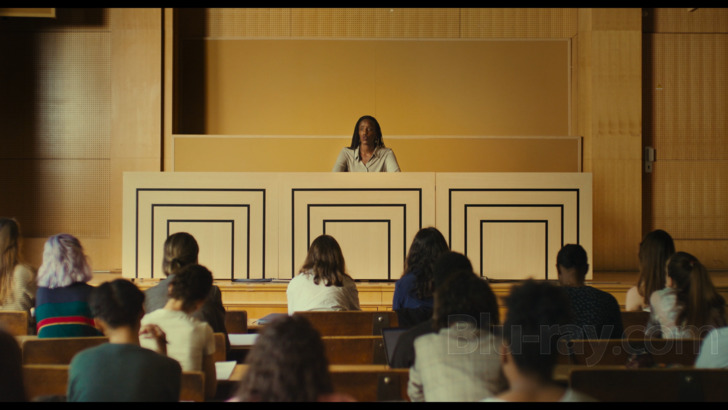
Saint Omer has received an MPEG-4 AVC 1080p transfer that is rich and warm. Despite the stodgy rigidity of the legal proceedings and the tragedy of the case being tried, the wood tones in the courtroom are luxurious and inviting. Primaries like the judge's red robe and Rama's yellow shirt have a nice pop to them and offer the only real blasts of color in a film dominated by tans, greens, browns, and blacks. Thankfully, fine detail is high, which allows us to inspect and enjoy facial particulars in the film's many emotional scenes. Not a tear will be missed whether it's simply welling in the eye or streaming down a cheek. Coly's knit sweater presents with a nicely fibrous texture, as do the jeans Rama wears. Brief exterior shots yield satisfying environmental particulars, and cluttered shops offer countless magazines, newspapers, and other products to inspect. And again, due to Diop's choice to hold the shots in this film for a considerable time, there is ample opportunity to examine every detail. It's an excellent transfer.
Saint Omer Blu-ray Movie, Audio Quality 
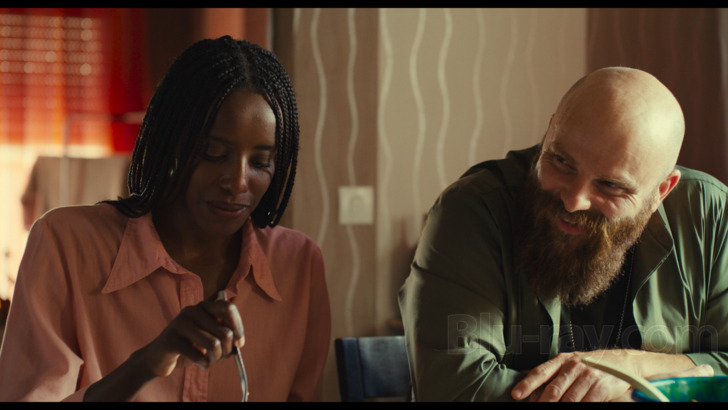
As one would expect for a film set in a courtroom, this is a dialogue-heavy film. Therefore, it should come as no surprise that the French DTS-HD Master Audio 5.1 track is front and center focused. The French dialogue is always clear and intelligible, and given the sparse atmospherics, environmentals, and a very limited use of music, it's never really in competition with any other sounds. Even in the brief and isolated moments where there is a fair amount of background chatter and leveraging the surrounds would make sense, the track instead opts to keep them in the fronts. Given the film's focus on language and the stylistic choices Diop made through the film's shooting and construction, it makes sense she wouldn't want to distract us with sonic trickery or flash, but it's worth noting. The surrounds are instead used with great subtlety to provide an ever so slight cavernous presence to the courtroom where the bulk of the film plays out, reinforcing the feelings of isolation our two leads feel and the concept of the use of language to create distance via the slight echo to every word spoken. To that end the track does exactly what it needs to do in it's rather starkly minimalist way. English subtitles are printed in white and are centered at the bottom of the image.
Saint Omer Blu-ray Movie, Special Features and Extras 
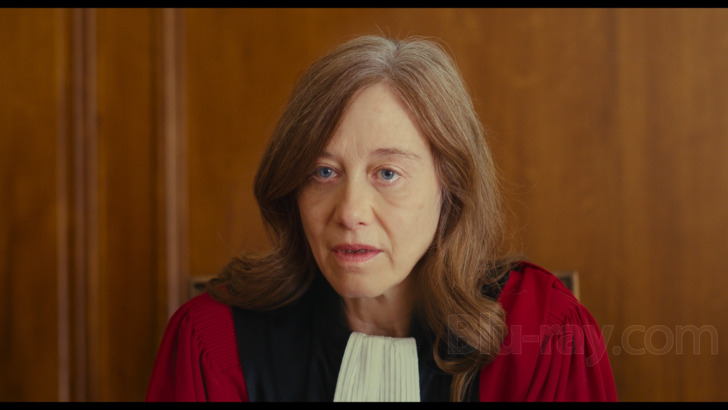
All supplemental features for Saint Omer except the trailer are found under the 'Alice Diop' menu option and consist of the following:
- 2022 Interview (10.14) - Diop discusses attending the trial on which Saint Omer is based and the concepts of with which the film concerns itself. She makes it clear that she is more concerned with the person rather than the material elements of the crime. Influenced by her background and a documentary filmmaker, she strove to make the film as authentic as she could, even using dialogue pulled verbatim from the actual court transcripts of the case. In French with English subtitles.
- 2023 Interview (9.19) - This audio interview opens with a few comments about a 35-year-old Senegalese woman, Fabienne Kabou, whose case serves as the foundation for the film. Diop goes on to address the film's themes and the emotional experience of shooting the films closing courtroom scene. In French with English subtitles over a series of stills and footage from the film.
- Alice Diop and Hélène Frappat (1.03.46) - In this wide-ranging and gently-moderated discussion recorded at Maison de la poésie in July of 2023, Diop and writer, translate and cinema critic Hélène Frappat cover a host of topics including how they met, the inspiration for the character of Rama, inspirations from film and literature, and the importance and use of language among other topics. In French with English subtitles.
- Alice Diop and Dee Rees (31.19) - Originally recorded for 'The Director's Cut - A Director's Guild of America Podcast', Diop discusses cinematic choices and her process over a static shot of the courtroom where the bulk film set and the Kabou trial actually took place. In English with Diop speaking through a translator.
- Trailer (1.59) - In French with English subtitles.
Saint Omer Blu-ray Movie, Overall Score and Recommendation 
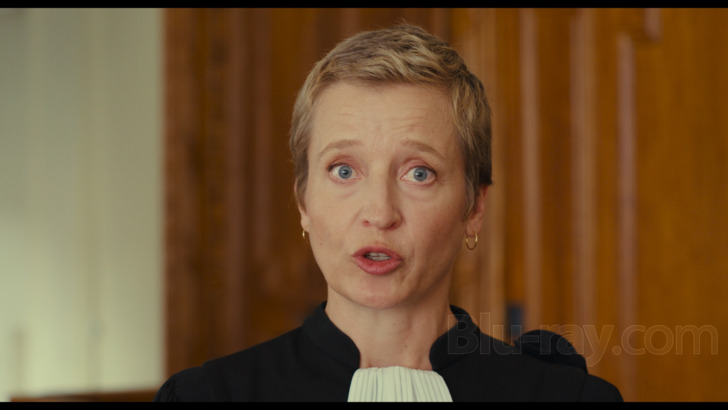
While I am loathe to spoil the outcome of the trial and the film in any way, I would be remiss if I didn't indicate that the defense attorney's closing statement is one of the most powerful and affecting moments in a film that I've seen in quite some time. Alice Diop's Saint Omer is an exemplary film that is more concerned with examining the human condition and the complicated and evolving roles a woman has over the course of her life than it is with such a customarily binary question of guilt or innocence. But even that isn't a simple question here. Guslagie Malanda and Kayije Kagame give outstanding performances in a film that won't just stand up to repeat viewings, it will demand them. Saint Omer earns my highest recommendation.
Similar titles
Similar titles you might also like

Happening
L'Événement
2021

The Insult
L'insulte
2017

One Sings, the Other Doesn't
L'une chante, l'autre pas
1977

Zama
2017

Panique
Panic
1946

Soleil Ô
Oh, Sun
1967

Out 1
Out 1, noli me tangere
1971

Touki Bouki
1973

A Separation
Jodaeiye Nader az Simin
2011

Sarah's Key
Elle s'appelait Sarah
2010

A Single Girl
La fille seule
1995

Indochine
1992

White Material
2009

Of Gods and Men
Des hommes et des dieux
2010

The Widow Couderc
La veuve Couderc
1971

Danton
1983

Je t'aime moi non plus
I Love You, I Don't
1976

Birds of Passage
Pájaros de verano
2018

The Measure of a Man
La Loi du Marché
2015

Capital
Le capital
2012